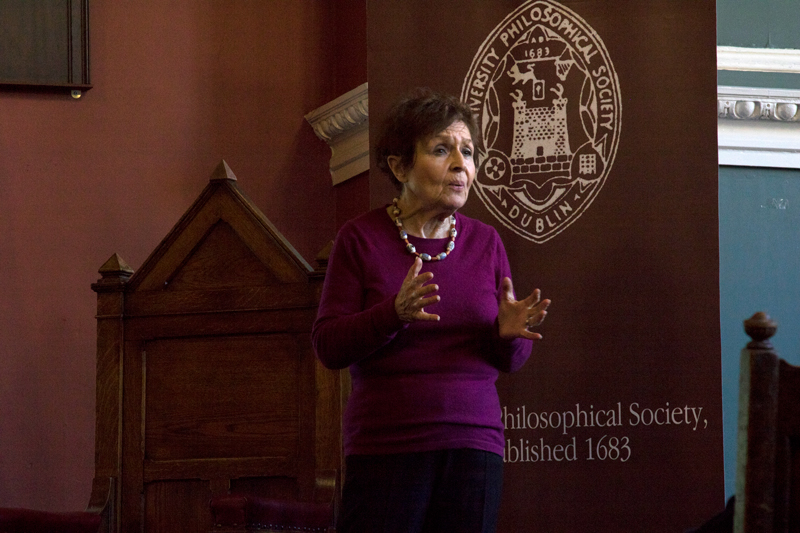
The world as we know it is becoming an increasingly intolerant place. Racism and antisemitism are on the rise across the globe and on the January 26th, 2019, the Secretary General of the United Nations, António Guterres, attended the United Nations International Holocaust Shabbat in New York, where he said: “Hate is moving into the mainstream.” He stressed: “Our urgent challenge today is to heed the lessons of a period when human dignity was cast aside for a racial ideology.”
On Tuesday evening, Trinity’s Jewish Society and the University Philosophical Society (the Phil) were proud to host Janine Webber, a Holocaust survivor, born in Lwów, Poland (now L’viv, Ukraine) in 1932. Webber’s testimony is all too important at a time when antisemitism and racism characterises the world’s political, cultural and social structures.
Webber first spoke about life before the war, describing her family and her “beautiful” town in Lwów, even sharing family photos with the audience. The faces of her family painted a picture of an idyllic and happy childhood. When Webber described the atrocities that later followed, however, the atmosphere in the room shifted to one of unwavering sadness.
Webber continued to describe the appalling conditions she and her family endured in the Jewish ghettos, where they were subjected to frequent Nazi raids. Her parents dug a hole under the wardrobe to hide, but it was only big enough for Janine, her brother and mother. During one raid, her father was shot and she never saw her grandmother again. Soon after, her mother fell ill from typhus and died, aged just 29. While recounting the last time Webber ever saw her mother, there was not a dry eye in room. Webber spoke of how, as a terrified child, she did not comfort her mother in her last days, which she now looks back on with great remorse and sadness.
Webber also spoke of her fear of the gestapo as a child. She explained that she wouldn’t dare to look the German soldiers in the eyes, but the memory of their pounding boots and of their loud voices haunts her. “They were always screaming”, she recalled. For years Webber suffered nightmares about those boots.
After the death of her mother, Webber’s uncle found her and he brother Tunio a hiding place in a nearby Catholic farm. After a few months however, the family’s daughter brought an SS man to the farm and although Webber narrowly escaped, Tunio was shot. Webber is still very angry at the betrayal she and her brother suffered by that Catholic family, and to this day, she is unsure as to why the SS man let her live.
Webber wandered the countryside until she found work as a shepherdess. But the Polish family she was living with soon learned of her Jewish identity. Fearing for their own safety, they bought Webber a train ticket to return to Lwów. Webber’s aunt, Rouja, had given her the name and address of a Polish man, Edek, the caretaker of a convent in Lwów, who she could contact in the case of an emergency. Edek reunited Webber with her aunt Rouja, her uncle and 12 other Jews in hiding. But, the conditions of the bunker were so poor that after a year, Rouja scrambled together fake papers for Webber to attend a Catholic orphanage. Webber finally moved to live with a Catholic elderly couple, where she worked as a maid until Kraków was liberated in early 1945.
Six months after the war ended, Webber was miraculously reunited with her aunt Rouja as well as her cousin Nina. Rouja asked her: “Do you know that you are Jewish?” Webber said that she did not know that she was. The three moved to Paris after the war and Webber later met an English man and married with two sons.
During the intimate questions-and-answers session, Webber admitted that to this day, she will not openly tell people she is Jewish, or even read a Jewish newspaper on the tube. Questions sprung up around the room about her views on growing antisemitism around the world, and she simply said how “frightened” she is. One of the reasons Webber gives talks now, she explained, is to increase awareness and give people the courage to “stand up” and “accept that we are all human beings … we all have the same roots … we must fight against [racism]”.
This event attracted students from all backgrounds, and even students from University College Dublin who were mesmerized by Webbers speech. It is impossible to relay the impact Webber’s words on the audience. I would suggest reading her full story on the Holocaust Memorial Day Trust website. Webber reminded the audience: “I am one of the very few who managed to survive.” Indeed, most heartbreaking of all is the fact that her story is not unique, but shared by 1.7 per cent of the total European population, as according to a 1933 census. What left the most lasting impression was Webber’s comment on her 7-year-old brother’s murder at the Catholic farm: “He wasn’t even aware that he was Jewish”. In today’s political climate, this sentiment of innocence must not be forgotten.






